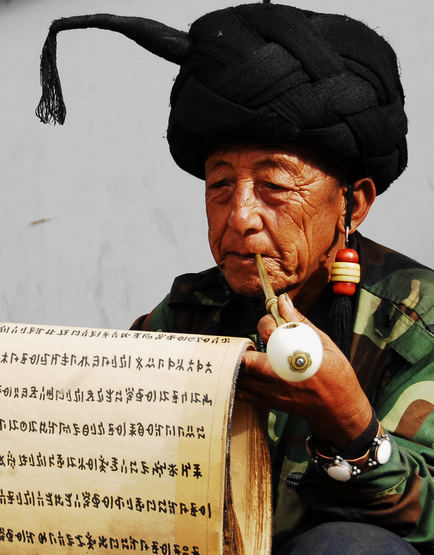
Bimoism(Chinese: 毕摩教; pinyin: Bìmójiào) is the indigenous religionof the Yi people, the largest ethnic group in Yunnan after the Han Chinese. It takes its name from the bimo, shaman-priests who are also masters of Yi language and scriptures, wearing distinctive black robes and large hats.
Since the 1980s, with the loosening of religion restrictions in China, Bimoism has undergone a revitalisation. In 1996, the Bimo Culture Research Center was founded. In the early 2010s, the government of China has helped the revival of the Bimoist faith through the construction of large temples and ceremonial complexes.
The bimo priests

(Bimo priest and his scripture)
The bimo, once taken to be the backward elements impeding the socialist construction, are now revered as guardians of the Yi culture. They are a positive force for development and construction of a harmonious society, and they organise large-scale rituals for the yearly Torch Festival.
Nosu Bimoism, the religion of the Nosu or Nuosu subgroup of the Yi, distinguishes two sorts of shamans: the bimoand the suni, respectively hereditary and ordained priests. One can become bimo by patrilineal descent after a time of apprenticeship or formally acknowledging an old bimo as the teacher. A suni must be elected.
Bimo can read Yi scripts while suni cannot. Both can perform rituals, but only bimo can perform rituals linked to death. In most cases, suni only perform some exorcisms to cure diseases. Generally, suni can only be from humble civil birth while bimo can be of both aristocratic and humble families.
Bimo officiate at births, funerals, weddings and holidays. They are often seen along the street consulting ancient scripts. The Yi worship deified ancestors similarly to the Chinese traditional religion practitioners, besides gods of local nature: fire, hills, trees, rocks, water, earth, sky, wind, and forests.
Ritual performances play a major role in daily life through healing, exorcism, blessing, divination and analysis of one's relationship with the gods. They believe dragons (symbols of generation) protect villages against bad spirits. The Yi dragon is represented in Yi art differently from that in Han art.
After someone dies, a pig or sheep is sacrificed at the doorway to maintain relationship with the deceased spirit. The Yi believe in numerous evil spirits. They believe that spirits cause illness, poor harvests and other misfortunes and inhabit all material things. The Yi also believe in multiple souls. At death, one soul remains to watch the grave while the other is eventually reincarnated into some living form.
You will only receive emails that you permitted upon submission and your email address will never be shared with any third parties without your express permission.
